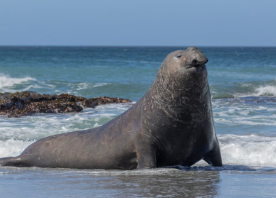H5N1 Outbreak Devastates Elephant Seal Population
The H5N1 strain of avian influenza has caused important mortality among elephant seals. Over 17,000 seals have died within a year. The outbreak has severely impacted breeding populations, particularly in Patagonia, Argentina. Research published in Nature Communications outlines the virus’s spread and its consequences.
Virus Transmission and Spread
The H5N1 virus transmitted primarily through marine mammals, including porpoises and dolphins. It spread along the coasts of Peru and Chile between 2022 and 2023. By June 2023, the virus had moved southwards in Chile. It eventually reached other South American shores, causing widespread mortality.
Impact on Elephant Seals
The outbreak has led to the deaths of 95 percent of elephant seal pups born in 2023. The peak mortality occurred between September and October. At least 35 adult and subadult seal carcasses were recorded at Península Valdés. This UNESCO World Heritage site is crucial for marine wildlife conservation.
The mortality event has altered the social structure of elephant seals. Mature alpha males are being replaced by subadults. The number of breeding females has also declined rapidly. This shift may have long-term effects on the population dynamics.
The breeding population is expected to see a low birth rate in 2024. Even if most adult females survived, the reproductive population has been drastically reduced.
Evolution of H5N1 Strain
Researchers have identified a novel marine mammal clade of the H5N1 HPAI virus. This clade shows mutations that enhance its ability to infect mammals. It retains the ability to infect avian hosts as well. The H5N1 viruses in Argentina belong to the B3.2 genotype.
The study indicates multiple spillover events from wild birds to marine mammals. There have been four independent spillback instances from marine mammals to coastal birds. These events raise concerns about the virus’s adaptability and potential public health risks.
Recommendations for Future Strategies
Researchers advocate for holistic strategies that link human, animal, and environmental health. Safeguarding biodiversity and promoting sustainable practices are essential. Improved global resilience against emerging infectious diseases is crucial.
Important Facts for Exams:
- Península Valdés: This UNESCO World Heritage site is vital for marine wildlife conservation. It is located in central Patagonia Argentina and supports diverse marine ecosystems.
- H5N1 HPAI: Highly pathogenic avian influenza is a severe viral infection affecting birds and mammals. The 2.3.4.4b clade has shown mutations enhancing its ability to infect mammals.
- B3.2 Genotype: The B3.2 genotype of H5N1 in Argentina is a reassortant. It contains segments from both Eurasian and North American lineages of avian influenza viruses.
- Spillback Events: Spillback refers to the transmission of a virus from marine mammals back to birds. This phenomenon raises concerns regarding the adaptability of the H5N1 virus.
Month: Current Affairs - November, 2024
Category: Science & Technology Current Affairs


